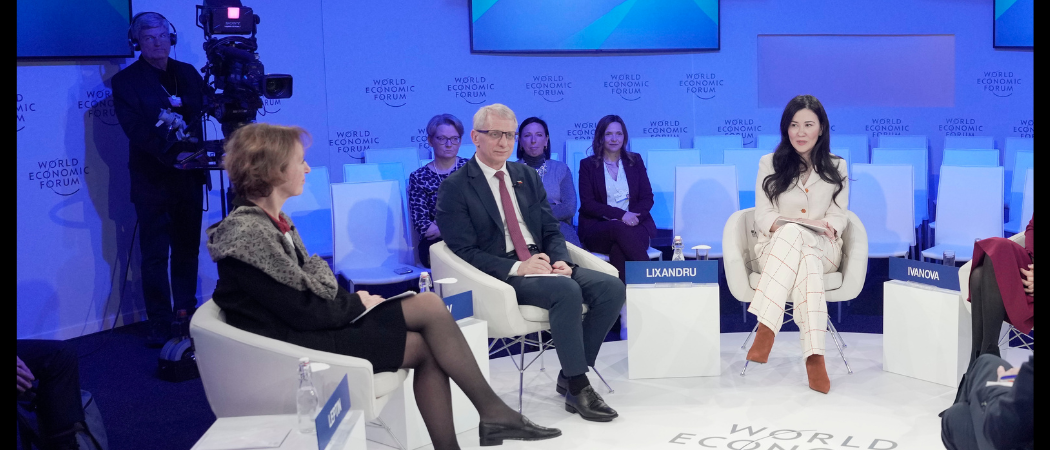Speaking at this year’s World Economic Forum, Nikolay Denkov hit out at Europe’s obsession with succeeding immediately when it comes to new technologies. It is important to experiment and fail, he says

Bulgarian Prime Minister Nikolay Denkov (Centre) speaking at the World Economic Forum alongside European Research Council President Maria Leptin (Left) and panel host Luciana Lixandru (Right). Photo: World Economic Forum / Flickr
Europe is lagging behind global competitors in innovation partly because of a reluctance to experiment and fail, Bulgaria’s prime minister Nikolay Denkov said during a panel discussion at this year’s World Economic Forum in Davos.
“To have a successful product, whether it is basic research or innovation, you need to experiment - and most [experiments] are failures,” Denkov, a chemist and a member of Bulgaria’s Academy of Sciences said.
“In [Europe’s] mentality and our funding, the idea was [long ago] implemented that you have to succeed immediately. It is something we are now changing but it takes time.”
Denkov was speaking on ‘Europe's Rush to Innovate’ a session which addressed the ingrained and long-running problem that Europe is a world leader in science and research, with its innovation performance increasing for the EU as a whole by almost 10% since 2016, but struggles to capture the economic value of its innovation prowess.
He also highlighted public-private partnerships as an area of weakness in Europe, citing the example of ITER, the enormous, multi-national nuclear fusion project based in France. While many hail the project as a success of science diplomacy that united international partners following decades of cold war, others have criticised it as being overly ambitious. The project is behind schedule and over budget.
Denkov said Europe’s choice to go for this big public-private partnership project was a mistake. “In other countries they chose the modular approach because it’s cheaper, faster, and you can fail many times, but in the end you go faster on a smaller scale,” he said. “We are now learning these lessons in Europe but we started late.”
Europe’s regulation-heavy approach to innovation was also called out by the Bulgarian prime minister because he said, it does not allow for experimentation.
Denkov was not the only member of the panel to express pessimistic views of Europe’s innovation ecosystem.
Dimitri de Vreeze, CEO of DSM-Firmenich, a Dutch/Swiss conglomerate that manufactures products ranging from perfume and cosmetics to animal nutrition, cited the Singaporean academic Kishore Mahbubani’s description of Europe as “the museum of the world”.
“People like to go there, like to visit, but if you really want to do something you go somewhere else, where the growth is [like Asia] or where the technology is [like the US],” de Vreeze said.
Ten years on from Mahbubani’s comment, “we still have that issue,” de Vreeze said, calling for Europe to choose more smartly where it invests in growth, focusing on certain technologies, bioscience and food and agriculture.
Public first, private later
To match pace with China, the US and other global competitors in innovation, Denkov suggested public and private investment in research and innovation needs to be better organised. He wants public money to be funnelled into breakthrough technologies that are not obviously going to be funded by companies. Once more commercial opportunities start to appear around that technology, private investment will follow.
AI is a good example of a technology that first needed public funds to get going but now should be left to the private sector to carry forwards.
Today, areas such as brain research and space technology should first be publicly funded for the next five to 15 years and then transferred “for more massive funding to the private sector”.
“[In areas like] energy or defence, they fund a lot of research with the clear understanding that you first need public funding and then you can make money after some level of development of the technology,” Denkov said. “This is the type of public to private transfer that we have to learn better to do.”
Denkov addressed the criticism that applications for EU research funding are too time-consuming. This is not necessarily the issue, rather the problem is the requirement to constantly report on a project during its lifespan, he said.
“When you fund science or innovation the only thing that matters is what the final results are, the rest is just details. A recommendation is to try to reduce the reporting, and focus on the real scientific and innovation results.”
The European Commissioner for research and innovation, Iliana Ivanova, also on the panel, welcomed this suggestion, promising that in the coming year there will be simplifications across all three pillars of Horizon Europe. “I’m very committed to that,” she said. “It is very important to simplify and alleviate the administrative burden.”





 A unique international forum for public research organisations and companies to connect their external engagement with strategic interests around their R&D system.
A unique international forum for public research organisations and companies to connect their external engagement with strategic interests around their R&D system.